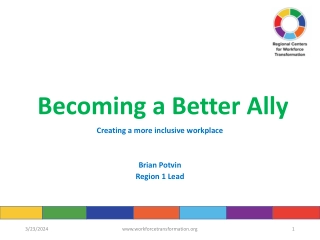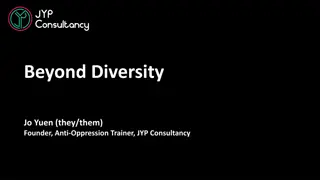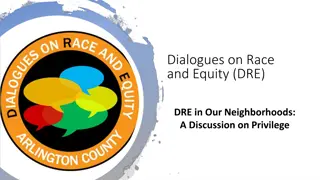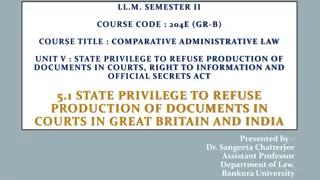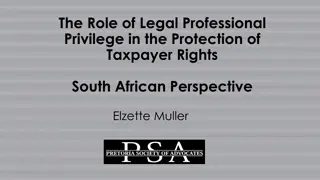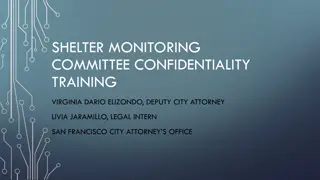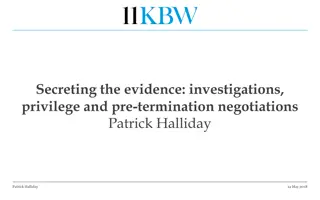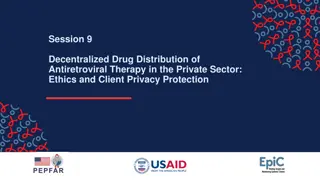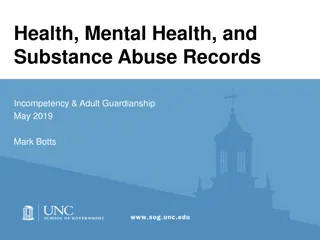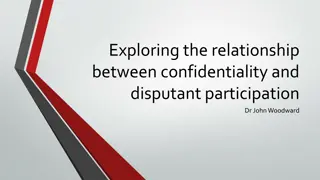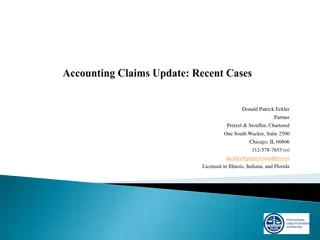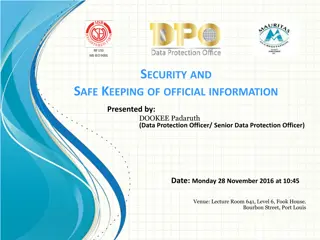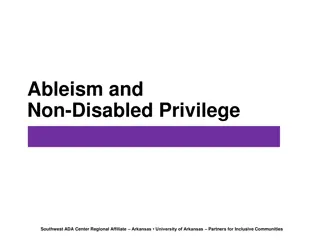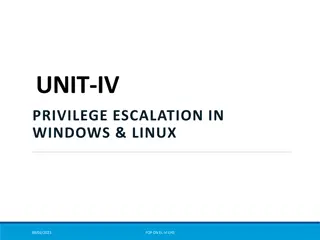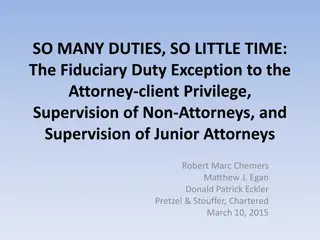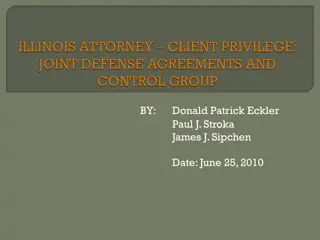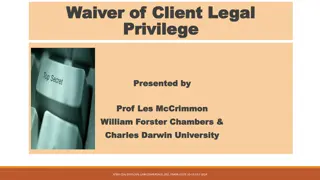Understanding Legal Privilege and Confidentiality in the Legal System
Legal privilege and confidentiality play crucial roles in protecting communications between clients and lawyers, especially in the context of legal advice and ongoing litigation. This article explores the nuances of privilege, types of communications covered, scenarios where privilege can be waived, and the issue of chaplain privilege in legal proceedings. Additionally, it discusses the development of confidentiality laws under common law and the Human Rights Act.
Download Presentation

Please find below an Image/Link to download the presentation.
The content on the website is provided AS IS for your information and personal use only. It may not be sold, licensed, or shared on other websites without obtaining consent from the author. Download presentation by click this link. If you encounter any issues during the download, it is possible that the publisher has removed the file from their server.
E N D
Presentation Transcript
PRIVILEGE AND CONFIDENTIALITY GGGGGGGGGGGGGGGGGGGGG General General GGGGGGGGGGGGGGGGGGGGG
LEGAL ADVICE PRIVILEGE Attaches to communications between the client and lawyers in connection with the provision of legal advice. Attaches to all communications made in confidence between lawyers and their clients. Will not cover communications between the lawyer and a third party who is not a lawyer. Will not cover documents obtained from third parties to be shown to lawyers for advice.
LITIGATION PRIVILEGE Communications between lawyers and clients and third parties when: Litigation is in progress or reasonably in contemplation. The communications are made for the sole or dominant purpose of the litigation. The litigation must be adversarial and not investigative or inquisitorial.
WAIVER Litigation Privilege can be waived: Implied waiver. Express waiver. Be aware iniquitous behaviour
CHAPLAINS Are communications with a Chaplain privileged?
CHAPLAINS R v Hay (1860) R v Kent (1865) Anderson v Bank of British Columbia (1876) Wheeler v Le Marchant (1881)
CHAPLAINS There can be no doubt that in a suit or criminal proceedings a clergyman of the Church of England is not privileged so as to decline to answer a question which is put to him for the purposes of justice, on the ground that his answer would reveal something that has been made to him in a confession. A witness is compelled to answer every such question and the law of England does not extend the privilege of refusing to answer to Roman Catholic clergymen who have obtained the information in confession from a person of their own persuasion. Lord Westbury, Lord Chancellor 1865.
CHAPLAINS Article 8 Human Rights Act. Canon Laws Church of England Roman Catholic Codex Iuris Canonici 1983 R v Leighton [2013]
CONFIDENTIALITY Development of Common Law and now referred to as Privacy. The courts continue to interpret and develop. Article 8 of the Human Rights Act.
WHAT IS CONFIDENTIAL A quality of confidence: Usually not trivia or in the public domain. The owner believes it is confidential or secret. The owner believes disclosure would be injurious to them.
WHAT IS CONFIDENTIAL Certain kinds of information about a person, such as information relating to health, personal relationships, or finances may be easy to identify as private, as may certain kinds of activity which a reasonable person would understand to be meant to be unobserved.
WHEN CONFIDENTIAL 1.Express. 2.Specific relationships. 3.The circumstances.
CHAPLAINS Are discussions with a Chaplain bound by confidentiality?
DEFENCES Now public knowledge. Release. Public interest to protect the vital interests of the individual or another. To protect children form significant harm or to protect an adult from serious harm.
Thank you Bernard Seymour Bernard@affinityresolutions.co.uk 07377 710875 Suzanne Lurie 07889 173767 Suzanne@affinityresolutions.co.uk Affinity Resolutions Ltd www.affinityresolutions.co.uk


